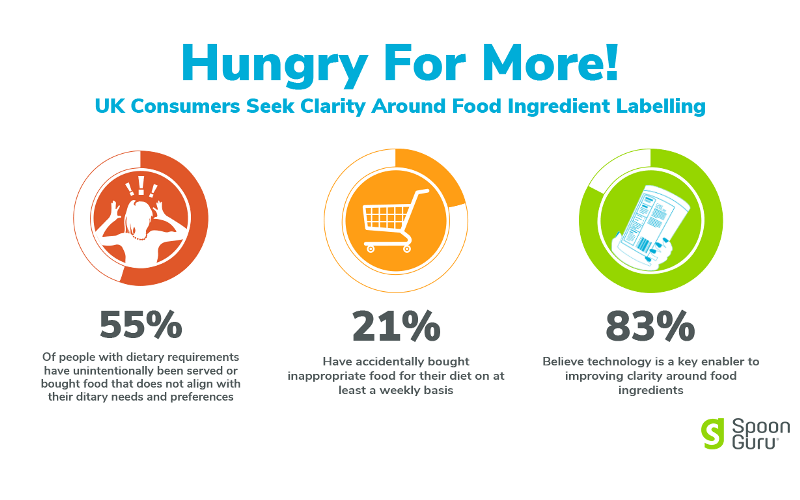New research has found that a staggering 55% of UK consumers have unintentionally consumed food restricted from their diet, with the number one reason being that over two thirds (70%) of respondents have been served the wrong food as an error by the waiting staff in bars and restaurants.

Image: 55% of UK consumers have unintentionally consumed food restricted from their diet. Photo: Courtesy of Spoon Guru.
Meanwhile, 42% listed poor food labelling as the second most common reason for purchasing incorrect products.
The study, commissioned by Spoon Guru, looked into the struggles of consumers throughout the UK that have food allergies, intolerances or lifestyle diets, and unveiled some shocking finds.
The worst affected were those trying to reduce salt, fat or sugar intake, with 55% saying they suffer the most from vague or non-existent ingredients labelling when trying to find the right products. Additionally, 70% of shoppers with severe allergies or intolerances indicated that they struggle to identify the right food for their dietary needs (53% for vegans specifically).
While grocery shopping is a simple task for most, almost 16% of those surveyed find it daunting. The data found Brits over 60, who have some form of exclusion diet, struggle the most (23%) when shopping for foods online or at supermarkets. The research revealed those looking to remove Palm Oil have the greatest challenge when it comes to food discovery, with 22% finding it challenging to match products to their preferences.
Markus Stripf, CEO and co-founder of Spoon Guru, commented: “With an increase of UK consumers adopting exclusion diets, whether due to medical reasons, intolerance or simply as a lifestyle choice, there is a clear need to make food discovery much more inclusive.”
“The study found there is astounding support (99%) for the idea that retailers should go above and beyond the current regulations to improve ingredient clarity, and the general feeling among UK consumers is for on-trade and off-trade retailers to take more accountability where food labelling is concerned.”
Stripf continued: “Interestingly, the data revealed that an overwhelming 83% of consumers believe that the use of technology will be a key enabler to solving the shortcomings surrounding food labelling transparency. While there are a lot of learnings and discussions to be had about how to make food discovery and shopping accessible, the great news is that more and more food businesses like restaurants and retailers are open to using smart technology as a platform to cater for people who have specific dietary requirements.”
Source: Company Press Release.
